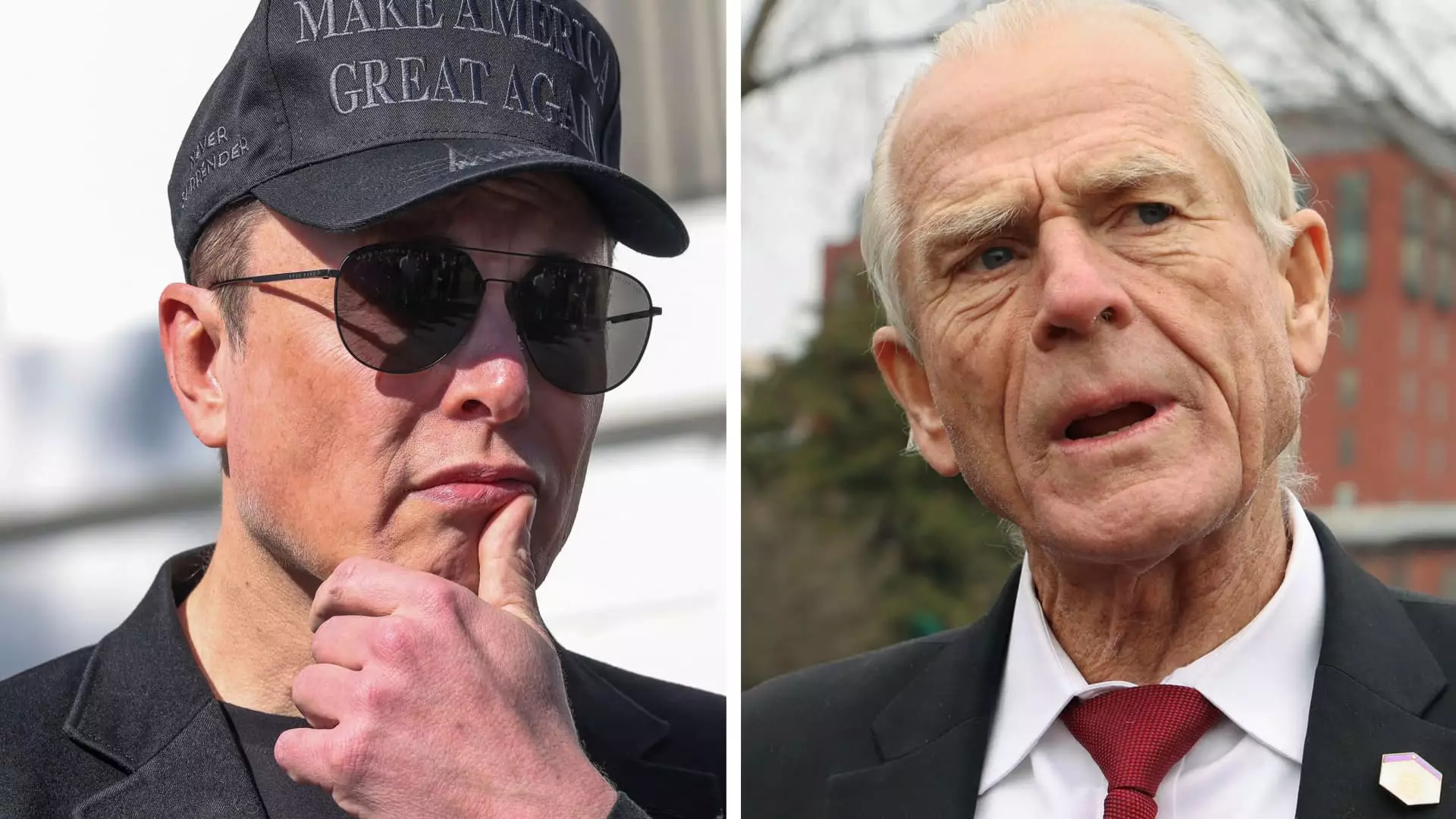In the volatile world of the automotive market, few names resonate louder than Tesla, Inc. CEO Elon Musk. Recently, the company has faced a significant downturn in its stock value, following a dramatic decline for four consecutive days. As the financial landscape shifts beneath his feet, Musk has chosen to channel his frustrations in a most combative manner—targeting key figures in the political sphere, notably Trump’s trade advisor, Peter Navarro. This public feud unveils not just Musk’s exasperation, but also highlights broader concerns about the auto industry and its interactions with trade policies.
Tesla’s shares have plunged 22% in a mere four trading days, leading to staggering losses amounting to $585 billion since the dawn of the new calendar year. As the world’s richest person, Musk’s fortune is closely tied to the performance of his companies, and this latest stock slump has sent ripples of financial distress through his empire. Public perceptions of Tesla have shifted considerably amidst this turmoil, and Musk’s responses reflect a defensive posture, teetering on the edge of approval and outrage.
Attacking Political Figures: An Unexpected Strategy
Musk’s criticism of Navarro sheds light on the friction between corporate America and the current administration’s trade measures. Instead of cultivating a more conciliatory relationship, Musk went on the offensive, derisively remarking that Navarro’s PhD from Harvard might be more of a liability than an asset. By labeling Navarro as “dangerously dumb” and expressing regret toward inanimate objects like bricks, Musk has augmented headlines and amplified the tension surrounding Tesla’s operational integrity.
The spat reveals a palpable dissonance within Trump’s circle; while some staunchly advocate for tariffs, others, like Musk, push for a radical reevaluation of these policies. Despite the tariffs potentially impacting Tesla’s ability to thrive in a cutthroat market, Musk has not hesitated to voice dissent, reaffirming his belief in zero tariffs between the U.S. and Europe. This invites speculation on the larger implications of this feud—not simply as an argument between two personalities but as a symbolic battle for the future direction of America’s trade policy.
The Tariff Tangle: Challenges Looming on the Horizon
Musk’s contentions are not unfounded. The imposition of tariffs on goods from multiple countries, including vital materials such as steel and aluminum, poses a significant threat to Tesla’s production processes. While Tesla enjoys an advantage by manufacturing vehicles domestically, the costs associated with imported parts cannot be ignored. Analysts anticipated that Tesla could weather the storm better than some competitors, yet the reality is shaping up to be more complex.
The rising costs of essential materials could lead to heightened production expenses, thereby squeezing profit margins and potentially resulting in increased vehicle prices. Musk’s augury for a zero-tariff trade zone between North America and Europe underscores his foresight and strategic thinking; it outlines a pragmatic approach that benefits not just his company, but also investors and consumers alike in a globally intertwined economy.
Musk’s Vision amid Operational Challenges
The picture becomes even murkier as Tesla continues to grapple with internal challenges. Reports of a 13% decline in year-over-year deliveries for the first quarter reveal vulnerabilities, which compound Musk’s burdens during a period of growing unrest within his operations. Despite these obstacles, Musk’s persistent calls for evolving trade relations hint at a forward-thinking mindset that is crucial for sustained innovation.
Moreover, it is vital to note that these struggles are not solely about numbers; they intertwine with public sentiment. Musk’s controversies, particularly his public persona and political participation, have ignited boycotts and protests aimed at Tesla’s operations. For every tweet or terse comment, there stands a repercussion—a truth not lost on a figure who has often thrived in the spotlight but now finds it equally daunting.
The Impact of Public Persona on Corporate Identity
An exploration into Musk’s public life reveals a man equally celebrated and criticized. His forays into political discourse, including the founding of the Department of Government Efficiency, illustrate an attempt to marry personal ideology with corporate strategy. Yet, this unusual fusion has led to conservative backlash and vocal opposition to his brand, creating a reality where Musk’s political affiliations may overshadow Tesla’s innovative advances.
As Musk’s public battles continue without resolution, one must ponder the long-term effects on Tesla and, indeed, the automotive industry at large. Is the escalation of personal grievances and the partisan commentary beneficial for a company desperately needing stability, or does it simply plunge further into chaos? The auto industry is at a pivotal juncture, and Musk’s vocal expression adds a uniquely volatile element to the ongoing narrative.


Leave a Reply